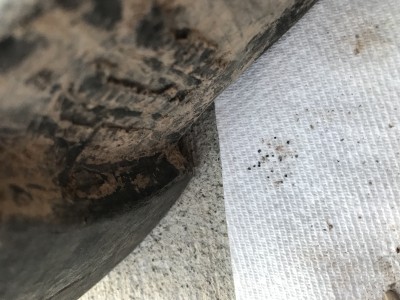The Muddy Boot Weed Seed Dispersal Method
Joshua Putman, Field Crops and Forage Specialist
Southwest New York Dairy, Livestock and Field Crops Program

Tall waterhemp is one of the most problematic weed species throughout the Midwest and has now arrived and spread to eight counties in Upstate New York. Waterhemp can spread from field-to-field and farm-to-farm on equipment, clothing, application equipment, or via water from over flooded ditches and rivers. Following a recent field day event we wanted to demonstrate the amount of weed seed that could travel back with you.
Boots that were considered "clean" were not as clean as we had thought (Figure 1). A knife was used to clean the boots and break up any hard clots that were present. Once the boots were clean, tweezers were used to separate the weed seeds from the dirt (Figure 2). We then separated out the pigweed/waterhemp seed from other weed seeds that were present and pigweed seeds were counted (Figure 3). We also double checked the dirt and found one pigweed seed stuck to a clay particle (Figure 4). Math was then conducted to estimate a 3 year establishment of waterhemp assuming 50% of the seeds were waterhemp and 100% were waterhemp, respectively.
The math is seen below:
16 pigweed seeds + 1 pigweed seed hiding in soil = 17 pigweed seeds from 2 boots.
Assuming only half of those are waterhemp and it can produce 250,000 seeds per female plant: 17/2 = 8.5 X 250,000 = 2.125 million seeds the following year in a field.
Assuming every seed on the bottom of the boots are waterhemp: 17 X 250,000 = 4.250 million seeds the following year.
Assuming 75% survival rate and reproduction in year 2: 4.250 million X 75% = 3.1875 million plants X 250,000 seeds per plant =
**796,875,000,000 seeds going into the soil in year 3 (potentially)
In conclusion, correct and early identification is very important; learn the correct features. Proper cleaning and sanitation of equipment, clothing, and vehicles can help prevent spreading. Intense management and continuous scouting are vital to eradication of this weed species. Mechanical control such as plowing can bury the seed deep which might decrease seed bank numbers.
Upcoming Events
Boots in the Barn: Cornell Dairy Research Updates
January 13, 2026
January 20, 2026
January 27, 2026
February 3, 2026
February 10, 2026
February 17, 2026
February 24, 2026
Join us for some or all!
Deerworm and Flukes in Small Ruminants Webinar
February 25, 2026 : Deerworm and Flukes in Small Ruminants Webinar
Dr. Mary Smith from Cornell's College of Veterinary Medicine and Dr. Rachel White from UMaine Cooperative Extension will be discussing the lifecycles, signs, prevention, and management of deerworm and liver flukes in small ruminants.
NYSDEC How to Get Certified Course
March 3, 2026 : NYSDEC How to Get Certified Course
Ellicottville, NY
NYSDEC training course in preparation to take the pesticide applicator exam.
Announcements
Cows, Crops & Critters Newsletter Sponsorship
TRYING TO REACH GROWERS AND AGRIBUSINESSES IN OUR SOUTHWEST REGION OF NEW YORK?Weekly Email Update: Shared with 625+ households who have signed up with our program.
Monthly Paper Mailer: To reach our stakeholders and farmers who lack internet access, we send out a monthly mailer where your company's logo and contact information would be featured with a mailing list of 330+ households.
If you sponsor our weekly and monthly publications you reach approximately 955 households.





